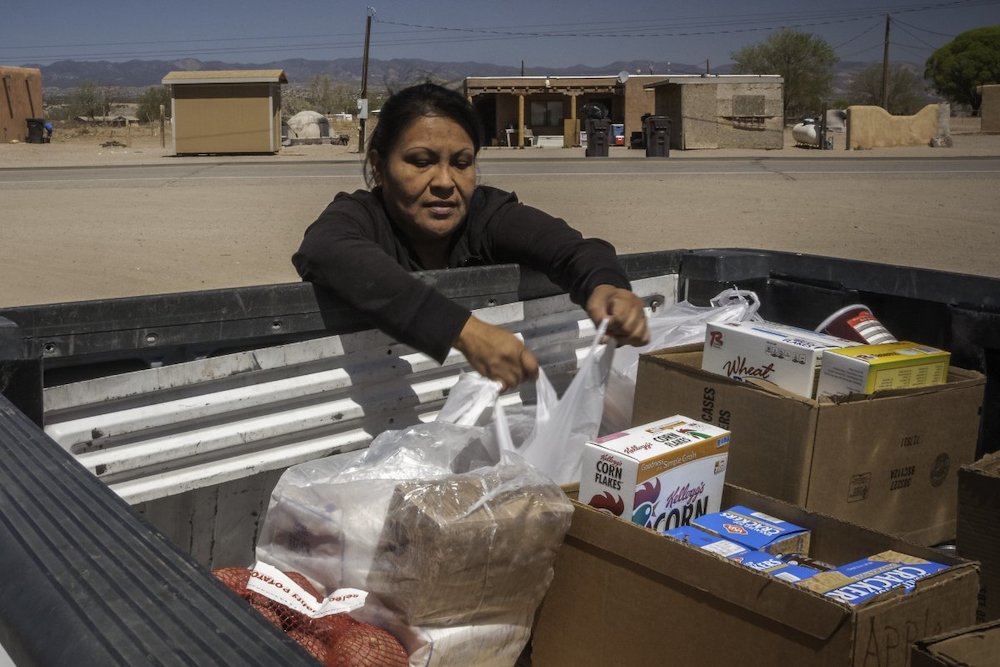
- Details
- By Chez Oxendine, Brian Edwards
- Food | Agriculture
WASHINGTON — New legislation that aims to expand food assistance for tribal households will be introduced in the U.S. Senate today, Tribal Business News has learned.
Sens. Patty Murray (D-WA) and Catherine Cortez Masto (D-NV) are expected to file a new bill that would allow individuals who are eligible for both the Supplemental Nutrition Assistance Program (SNAP) and the Food Distribution Program on Indian Reservations (FDPIR) to use both programs in the same month.
The proposed Tribal Access to Nutrition Assistance Act would amend the Food and Nutrition Act of 2008 to allow for dual enrollment in the programs with a goal of increasing food security among Tribal communities, which suffer from rates of food insecurity that are much higher than the general public. The bill also eliminates the administrative burden that forces individuals who qualify for both SNAP and FDPIR to pick between programs each month.
“Tribal families and individuals in Washington state and across the country should not be forced to pick between nutrition assistance programs each month when they plainly need, are eligible for, and should have access to both,” Murray, chair of the Senate Appropriations Committee, said in a statement to Tribal Business News.
Murray called the legislation “a common-sense fix” that will make sure fewer Native people go hungry and lower the hurdles that Native families have to clear when they switch between programs. “Individuals who are eligible for other food assistance programs, like WIC, can use those benefits on top of SNAP—and there’s no reason that the FDPIR benefits that are so important to Tribal communities should not work the same way,” she said.
The FDPIR program provides U.S. Department of Agriculture-approved foods to income-eligible households living on Indian reservations, as well as to American Indians residing in approved areas. About 75,000 Native Americans and 276 Tribes receive benefits under FDPIR, which is intended to be a supplemental food package because it doesn’t meet the full nutritional needs of Tribal individuals. Even so, a USDA study found that FDPIR is the sole or primary source food for 38 percent of households who are enrolled in the program.
“Tribal members should never be in a position where they go hungry, and it’s common sense to make sure Indian Country has access to the same food assistance programs as everyone else so these communities can get the food they need to stay healthy,” Cortez Masto, a member of the Senate Committee on Indian Affairs, said in a statement.
A large number of Native households participate in FDPIR as an alternative to SNAP because they don’t have easy access to SNAP offices or authorized food stores. Under the new legislation, more than 65,000 Tribal individuals could enroll in both programs, according to an estimate from Murray’s office.
The current law creates “an administrative headache” for people who choose to move between the two programs and “unfairly targets” Native Americans who need greater access to healthy, nutritious foods, according to Shakopee Mdewakanton Sioux Community Vice-Chairman Cole Miller and Intertribal Agriculture Council Executive Director Kari Jo Lawrence, who co-chair the Native Farm Bill Coalition.
“The Tribal Access to Nutrition Assistance Act would promote food security in Indian Country by removing an unprincipled barrier and authorizing Native Americans to access both FDPIR and SNAP on par with individuals using other federal feeding programs,” they said in a statement.
The Farm Bill Coalition is one of a lengthy list of Native tribes and advocacy groups that support the legislation, including the Yakama Nation, the Colville Tribes, the Shakopee Mdewakanton Sioux Community, the Intertribal Agriculture Council, the National Congress of American Indians, the Seattle Indian Health Board, the National Association of Food Distribution Programs on Indian Reservations, and Tahoma Peak.
Yakama Nation Tribal Council Chairman Gerald Lewis expressed appreciation for Murray’s work to introduce the legislation that fixes a “glitch” in the law that prohibits Indian families from dual enrollment in FDPIR and SNAP.
“This act fixes that glitch and will definitely aid households here on the Yakama Reservation, even more so with the cost of foods rising and with limited availability of affordable food,” Lewis said in a statement.
The introduction of the legislation comes one day after a Senate Committee on Indian Affairs hearing where FDPIR took on new significance in proposed amendments to the 2023 Farm Bill.
The Farm Bill Coalition sees FDPIR as a new avenue for tribal sovereignty, aiming to secure legislative support for giving tribes control over what goes into the program’s food packages - namely under “638 Projects,” which leverage the Indian Self-Determination and Education Assistance Act to allow tribes to take over governance of the contents of FDPIR packages.
Pilot 638 projects were launched under the 2018 Farm Bill, giving eight tribes and health organizations greater control over their food distribution, leading to localized choices from nearby producers, including many that produce traditional foods linked to tribal cultures.
The projects have proven popular and in keeping with the Tribal Access to Nutrition Assistance Act, not only do members of the Farm Bill Coalition want the 638 projects expanded to other tribes for their FDPIR packages, they want tribes to have more control over SNAP distributions, too.
“Government programs administered at the local level are best suited to be responsive to the needs of local community members and more effective in identifying eligible participants,” said Abi Fain, Director of Policy and Government Relations at the Intertribal Agriculture Council. “The same is true for SNAP and supports the need for Congress to authorize federally recognized Tribes to administer SNAP.”